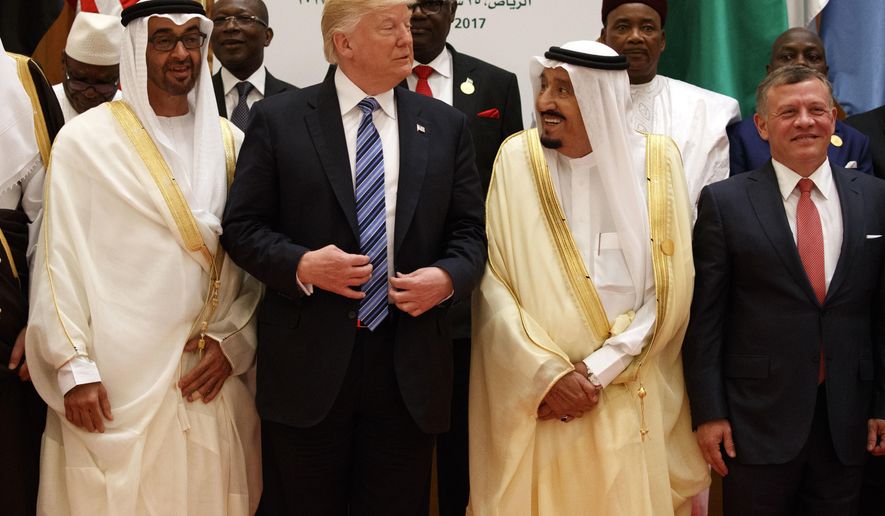President Trump doesn’t bow.
He wasn’t likely to bow before he became the leader of the free world, so it shouldn’t have been a surprise when he didn’t genuflect before Saudi King Salman as President Barack Obama did in 2009.
In this way, however, the same unconventional style that propelled Mr. Trump to the White House is leaving a singular mark on the world stage as he takes his first trip abroad as president.
Mr. Trump easily broke with tradition and with norms set by his predecessor, as well as reinvented his own image from that on the campaign trail, as he navigated diplomatic protocol and hobnobbed with royalty in Riyadh, Saudi Arabia.
In a strong start to the journey, Mr. Trump inked arms sales and economic investment deals with Saudi monarchy and charted a new course for U.S. anti-terrorism and foreign policy with a speech to leaders from 50 Muslim countries.
“It’s the beginning of a turning point in the relationship between the United States and the Arab and Islamic world,” Saudi Foreign Minister Adel al-Jubeir told reporters in Riyadh.
Despite criticism that his campaign rhetoric had alienated America’s Muslim allies, Mr. Trump received a hero’s welcome when he landed Saturday in Saudi Arabia, kicking off an eight-day trip across the Middle East and Europe.
He was greeted on the tarmac by King Salman, an honor denied to President Obama in 2009.
Mr. Trump gave the king a firm handshake rather than the deep bow bestowed by Mr. Obama, a symbol of subjugation that the Obama White House denied had occurred.
Mr. Trump’s critics later claimed that he, too, bowed when receiving the King’s Medal, the country’s highest civilian honor. But Mr. Trump had to lower his head to receive the honor from the king, who at 81 years old is much shorter that the 6-foot-2 president.
The same medal was presented to Mr. Obama. It’s part of the trappings of presidential travels that Mr. Trump gladly partook.
At a royal banquet Saturday night, Mr. Trump didn’t hesitate to grab a saber and join in a traditional Saudi sword dance. That’s what presidents sometime have to do when overseas. They don outfits or props associated with local custom and risk embarrassment and ridicule in the press and on late-night TV.
It remains to be seen whether Mr. Trump, who is Presbyterian, bows at his audience with Pope Francis at the Vatican later this week.
First lady Melania Trump broke with local custom, however, by not wearing a headscarf in Saudi Arabia. Wearing a headscarf is not mandated by Saudi Arabia’s ultraconservative Shariah law, but women are required to dress modestly and headscarves are encouraged for that reason.
Mrs. Trump’s bare head drew extra attention because of her husband’s past criticism of those who do not follow that custom, namely former first lady Michelle Obama.
“Many people are saying it was wonderful that Mrs. Obama refused to wear a scarf in Saudi Arabia, but they were insulted. We have [enough] enemies,” Mr. Trump tweeted at the time.
Mr. Trump deviated from other past rhetoric, including not using the phrase “racial Islamic terrorism” when addressing the Muslim leaders. He had harshly criticized Mr. Obama for not using the phrase, saying he couldn’t defeat an enemy he refused to call by name.
Still, Mr. Trump did refer to “Islamists” and “Islamic terrorism,” urging Muslim countries to look within their borders for the source of extremism that spreads death and destruction around the globe.
The message left no doubt about the shift in policy in the U.S.
• S.A. Miller can be reached at smiller@washingtontimes.com.




Please read our comment policy before commenting.